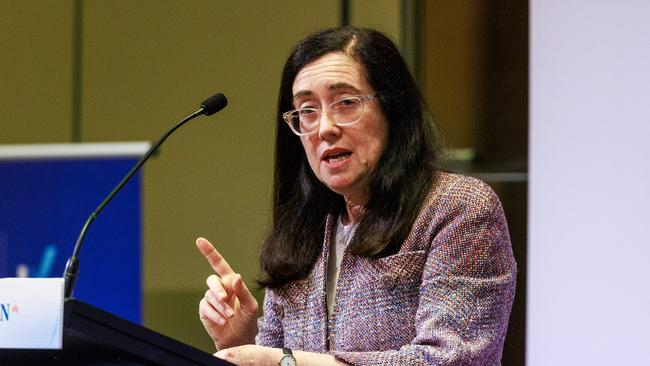ACCC calls for new laws to rein in Apple, Google, Microsoft, Meta and Amazon
New laws are needed to protect consumers from harm as tech giants expand deeper into smart home devices and collect more valuable data.

Australia’s competition watchdog has put big tech on notice, warning its rapid expansion into smart home devices and cloud storage, risks harming consumers via “invasive data collection practices” and stifling innovation by crushing smaller rivals.
The Australian Competition and Consumer Commission says new laws are needed to rein in the market power of the world’s five biggest tech companies: Apple, Google, Microsoft, Meta and Amazon, criticising their “expanding reach into our daily lives and livelihoods”.
The call for regulatory reform is part of the ACCC’s five-year inquiry into the local market dominance of the digital titans.
The regulator has been publishing reports every six months to provide updates on the inquiry’s process, with its latest taking aim at big tech “ecosystems” that risk locking in consumers and limiting their choices.
ACCC chair Gina Cass-Gottlieb said digital platforms have expanded beyond their original core offerings – such as search and social media – to other markets including generative AI, digital health services, information storage, education, and financial products.
“As digital platform service providers expand, they have greater access to rich consumer data, which they can collect and use throughout their ecosystems of products and services,” Ms Cass-Gottlieb said.

“For example, Amazon, Apple and Google collect vast amounts of consumer data through smart home devices. It’s not always clear from the relevant privacy policies if the data collected exceeds that which is needed for device functionality or product improvement.
“Consumers who use multiple products from a single digital platform may be forced to agree to unfavourable terms and conditions and/or accept unpalatable data collection practices due to a lack of suitable alternatives or because it is simply too inconvenient or costly to move out of that ecosystem.”
But Meta, which owns Facebook, said: “there is nothing inherent in digital ecosystem businesses that present greater risks of anti-competitive conduct or consumer harm than in other sectors”.
Microsoft says the ACCC needs to continue its “market-specific analysis when considering firms’ expansion activities and conduct”, while Apple and Amazon said its expansion into smart devices is “relatively recent”, and Google said there were consumer advantages from its products working well together.
But Ms Cass-Gottlieb said competition laws needed to be updated to ensure that digital platforms benefit and not harm consumers.
“Our proposed reforms include a call for targeted consumer protections and service-specific codes to prevent anti-competitive conduct by particular designated digital platforms.
“The recommendations include new service-specific mandatory codes of conduct for particular ‘designated digital platforms,’ based on principles set out in legislation.”
Cloud storage is commonly embedded with digital platform operating systems or bundled with other offerings and in some cases is not available as a stand-alone product,” Ms Cass-Gottlieb said.
“Integrated cloud storage services can be convenient for consumers, but they can also discourage consumers from purchasing new products and services outside the ecosystem. This makes it harder for competitors who offer stand-alone services to compete and potentially stifles the development of innovative products,” Ms Cass-Gottlieb said.
“When a digital platform holds a crucial ‘gatekeeper’ position between consumers and businesses, it has the opportunity and incentive to harm competition.”
The ACCC has proposed that this new regulatory regime would work alongside Australia’s existing competition laws to curtail anti-competitive conduct, unfair treatment of business users and barriers to entry and expansion by potential rivals.
In a submission for the ACCC’s latest report, Amazon said it was primarily a retailer.
“Amazon manufactures and supplies a small range of smart home devices, a virtual assistant (Alexa) and it does not hold a strong or unique position with respect to any of the components identified for so-called ‘ecosystems’,” it said.
“When Amazon does collect and use data from Amazon smart home devices we are transparent about this, and customers’ data is only used and disclosed in accordance with Amazon’s or its subsidiaries’ privacy notices.”
Apple said its entry into smart home devices was “comparatively recent” and it was “incentivised to create a robust ecosystem across Apple devices, which includes as many quality apps and third-party interoperability as possible”.
“The health and diversity of this ecosystem is critical to Apple’s success because it, in turn, drives the sale of our hardware products. Apple therefore has a strong incentive to keep its ecosystem open and to deliver choice and quality to consumers,” Apple said.
Microsoft, which welcomes regulation, said in its submission that Amazon, Apple, Meta, Google and itself supplied a different range of products and services and was “competing for a different mix of customers”.
“As a widely diversified technology company, we have appreciated the ACCC’s focused examination of digital platform services to date. We urge the ACCC to continue to recognise the heterogeneity of different digital platform services and to continue to undertake market-specific analysis when considering firms’ expansion activities and conduct,” Microsoft said.
Meta, meanwhile, said the ACCC definition of an ecosystem was “extremely broad”.
“Ecosystems within the ACCC’s definition can be observed across the Australian economy, from telecommunications, to banking, to retail, and there is nothing inherent in digital ecosystem businesses that present greater risks of anti-competitive conduct or consumer harm than in other sectors,” Meta said. “We caution against over-reliance on the concept of an ‘ecosystem’ and any attempt to reach generalised conclusions about digital platform expansion strategies.”
Google said in its submission that there were consumer advantages from its products working well together.
“This consumer advantage is further enhanced by significant interoperability with third-party devices, services and apps,” it said.
“We believe our approach and business model can be distinguished from others in this regard.”






To join the conversation, please log in. Don't have an account? Register
Join the conversation, you are commenting as Logout